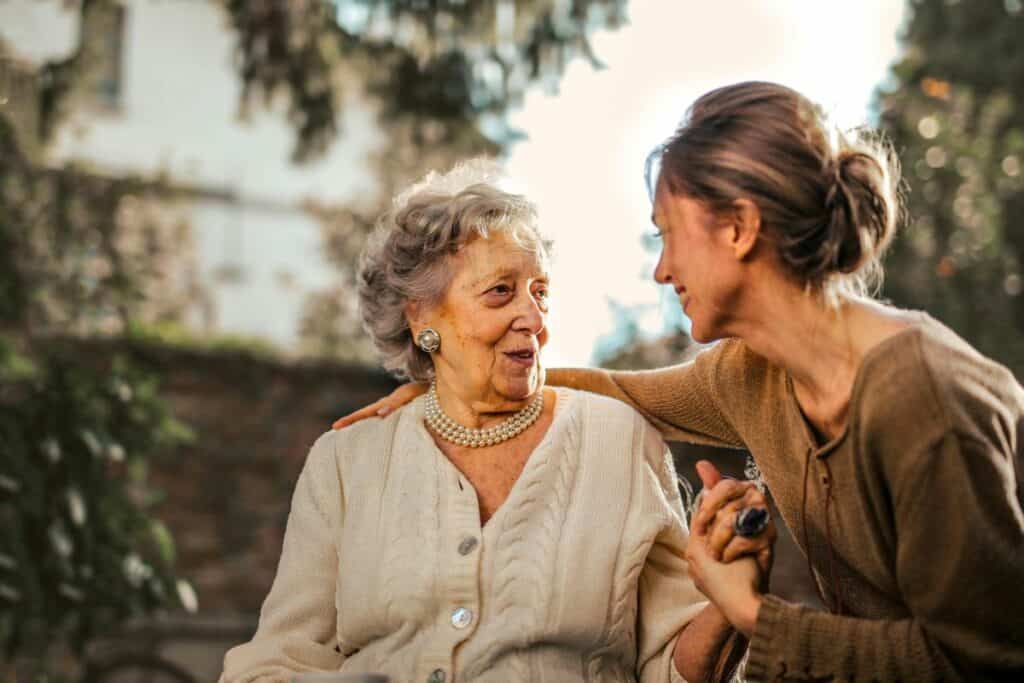Ministering for Life

Author: Sian Brookes
Friend to Faith in Later Life, Sian Brookes, is currently studying for a Doctorate in Theology at Aberdeen University. She is particularly interested in the role of older people in society and how the Christian faith and contemporary church can speak into this. She has also worked with older people in care homes and in the charity sector in Health and Social Care programme design. In this blog, Sian, helps us to explore the ‘upside down’ nature of lifelong ministry in the kingdom of God.
One of the aims of Faith in Later Life is to enable and mobilise older people to minister meaningfully for the whole of their lives. What does this mean? It’s easy to imagine the kind of ministry that some older people could engage in. We might jump straight to those of us who have just retired, who still have a good degree of physical and mental capacity and suddenly have a lot of spare time on our hands. The likes of these are gold dust to many church ministries; the toddler group struggling to find enough young-mum or dad volunteers who are run off their feet chasing after their two-year-olds will be delighted to have an influx of men and women who can sort logistics, look out for those who are struggling and pray for others without a toddler hanging onto their legs. Or perhaps even those of us who are growing older into our 80s and 90s yet still demonstrate a remarkable ability to continue to “do” things as though we were still young; those of us who still turn up, still offer wisdom, advice, kindness, love and hospitality to the younger generations despite their age. Or those of us who can still make it to the older people’s teas, even if it means just showing up and chatting to people. These people are a gift in their ability to minister to others who may not find church the most comfortable place to be, or who might be looking for hope beyond what this world can offer.
But what happens when older people can’t minister meaningfully in these specific kinds of ways? When dementia sets in and we no longer have physical or mental capacity to offer as we might once have done? Or when we are nearing the end of life and we can do little more than lie in a bed and receive the care of others? Or when we can no longer make it to church in our own capacity to volunteer through providing physical or moral support to others in the way we once did? How do we minister meaningfully then? Or perhaps instead, at that point do we simply become receivers of the ministry of others?
In our society we have a significantly limited understanding of what it means to be a human being who is able to “act” in a meaningful way. We live in a world shaped by the idea that before we exist in community with others, we are individuals with our own inner source of identity and our own internal driver for our ability to “do” things – and that is where our value comes from. As a result, when we get to a stage of life where we can no longer do things on our own, because of age-related decline, and increased incapacity, we are quick to assume that we have little to offer meaningfully. In church circles, you hear it often said that the little old lady who is housebound can only do one thing that is meaningful, and that is to sit at home and pray. Now this is not to limit or question the power of prayer and the legitimacy of that as a fundamental calling. But prayer should not be limited to those who cannot “do” other things, and nor should the limits of old age preclude us from being able to minister meaningfully in other ways. In fact, those of us who display significant limits to their physical and mental capacity, be it through dementia, loss of mobility due to arthritis, or simply being in the stage of life which is approaching death quickly, perhaps in our final days can minister just as meaningfully as those who do not share those same characteristics. Sometimes, because of what our society values, we just need to look a little harder to discover how.
Take one example, in my last church there was a lady in her 90s named Lilian (name changed for privacy purposes). Lilian suffered from crippling anxiety as a result of increasing frailty and struggled to leave the house. She lived alone and was estranged from her only son. She had a deep faith in Jesus and loved to come to church but needed an army of people who would volunteer to pick her up and drive her each Sunday, and during the week for other events. Lilian could do very little on her own and didn’t really spend a lot of time passing on the wisdom she had accumulated throughout her life, nor did she pray very much for us, as far as I could tell. Many would describe Lilian as a burden; she certainly took up a lot of time and effort on my part and others from the church to help her. when sometimes I could have done without the extra trip on the way to church, and when my children wanted my full attention. But what she did offer me, and the others who got to know her, was the chance to be a person who cared. Lilian was always open to being loved, always received our care with great gratitude and whilst not always being in a good mood or a particularly easy person to be around, was always available and welcomed us in when we showed up.
Eventually, Lilian died following a particularly bad fall. And it was only in the days following Lilian’s death, when I realised that she wouldn’t be there any more for me to go and collect and take to church, that I understood that far from me having spent all those months giving to Lilian, actually Lilian had been giving a gift to me. In Matthew 25 Jesus says these words: “For I was hungry and you gave me something to eat, I was thirsty and you gave me something to drink, I was a stranger and you invited me in, I needed clothes and you clothed me, I was sick and you looked after me, I was in prison and you came to visit me.”. In being someone who allowed us to care for them when they were sick, in being someone who was once a stranger who allowed us to invite her in, Lilian let us meet with Jesus, in herself. And what a precious gift this was. In the absence of apparently being able to “do” anything meaningful in the world’s eyes, Lilian was able to give us the most precious gift of all, the gift of being Jesus to us in this way.
So next time you are looking to discover a way for older people to minister in your church, don’t forget those who look as though they have nothing to offer. Perhaps simply by their very presence they might have a huge amount to offer. In the dependence, in the need, in the fragility it is here where we find Jesus. If we only believe it is the young and able who are offering something to them, we will miss something crucial about what it means to be human in interdependence with each other. Dietrich Bonhoeffer wrote, ‘Christians must bear the burden of one another. … Only as a burden is the other really a brother or sister and not just an object to be controlled.’. In a world which struggles to see this, let’s make sure that our churches are not void of those who society might deem to be a burden, but bring them into the centre, so that many more might meet Jesus in this way.
